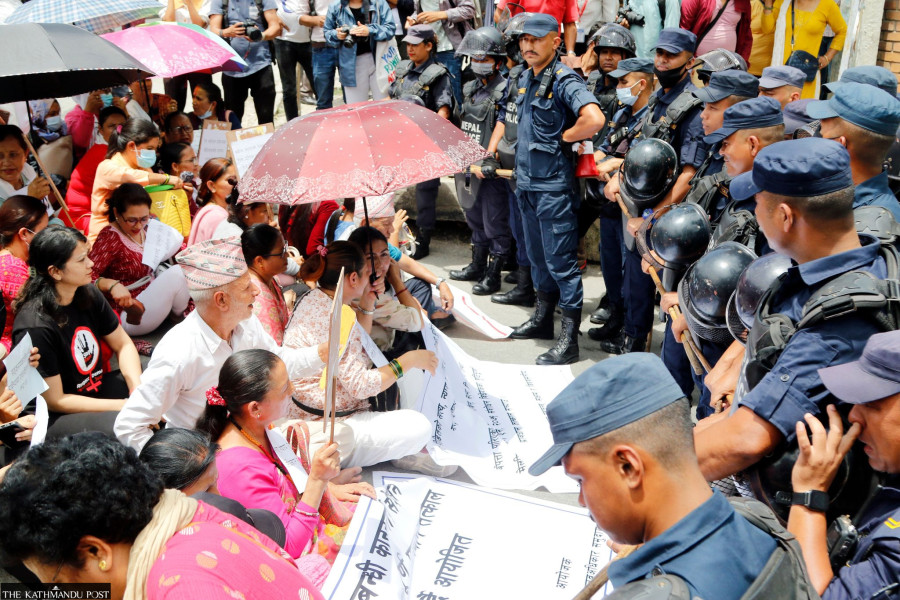National
Insurgency victims come up with 27-point demand
Want extrajudicial killings and unlawful killings listed as serious human rights violations and the authority to reduce penalties resting with judiciary.
Binod Ghimire
Insurgency era victims have made public a 27-point demand that they want addressed in the amendment bill to the Enforced Disappearances Enquiry, Truth and Reconciliation Commission Act that remains bogged down in Parliament for a year now.
The Law, Justice and Human Rights Committee of the House of Representatives remains indecisive on the bill following sharp differences between the ruling and opposition parties mainly in four issues. The bill registered in the Federal Parliament in March last year received 27 amendment proposals from lawmakers. In May a sub-panel was formed to streamline the amendment proposals and find meeting points within the parties. However, the sub-committee, despite months-long discussions, submitted an incomplete report to the committee in October as it failed to build consensus among the ruling and opposition parties.
The sub-panel couldn’t decide whether to catergorise arbitrary killings or all killings except those that occurred in clashes as serious violation of human rights. The conflict victims have said extrajudicial killings, murder of unarmed individuals or all the unlawful killings should be mentioned as serious human rights violations. They have also demanded that serious mental and physical torture should also be listed as serious violations of human rights, thus non-amestiable.
The parliamentary committee also has not been able to settle what happens in case the victims of human rights violations refuse to reconcile. The victims say every case where there is no reconciliation should be prosecuted. Though there is an agreement among the parties that the penalties for the perpetrators who cooperate during investigations can be reduced, they have yet to agree on the amount of reduction. The victims insist that the authority to reduce penalties should rest with the judiciary. It would be wrong to mention about the penalty reduction in the Act itself.
Citing the Comprehensive Peace Agreement, victims’ groups have demanded that the amended bill must clearly mention that war crimes and crimes against humanity must be listed as non-amnestaible. Clause 5.2.5 of the peace agreement says crimes against humanity and war crimes should also be listed as serious violations of human rights.
The ruling parties don’t want to include the provisions arguing that no war crimes or crimes against humanity took place in the decade-long insurgency. “An impartial and free selection committee must be in place to pick the office bearers in the two transitional justice commissions. The five-member selection committee led by a retired chief justice should have three retired justices of the Supreme Court and a representative from the National Human Rights Commission as members,” reads one of the demands from the victims.
The parliamentary committee has agreed to allow four years to the Commission of Investigation on Enforced Disappeared Persons and the Truth and Reconciliation Commission to investigate victims’ complaints and deliver justice. Looking at the volume of the cases, the conflict victims have demanded a provision for a possibility of terms extensions of the commissions if they fail to complete their jobs in four years. They also have said that six months should be alloted to register complaints for those who haven’t already done so.
As many as 63,718 complaints are under consideration in the truth commission while the disappearance commission has around 2,500 complaints to investigate. “The sub-committee has included several positive provisions. While welcoming those provisions we want the parties to become serious to address our other concerns,” Gopal Shah, chairman of the Conflict Victims National Network, told the Post.
The victims of rape and sexual violence, as per the bill, will get three months to register their complaints from the date of enactment of the amendment which the victims say is a positive development. They also have lauded the provisions to form different sub-units within the TRC for truth-seeking and investigation, deciding reparations, investigating cases of rape, sexual violence, and serious violations of human rights, and for coordinating with the victims.
Formation of a special court to decide on the cases related to insurgency and a provision to allow an appeal in the Supreme Court if victims are dissatisfied with the special court’s decision too is a positive step, say the victims.
The conflict victims have blamed the top leadership of the Nepali Congress, CPN (Maoist Centre) and the CPN-UML for delaying the amendment for their personal and party benefits. While the ruling parties are for endorsing the bill in the present form, the UML has been saying it needs to be revised as demanded by the victims and human rights communities.
Owing to the differences, when will the bill be presented in Parliament remains unsure. “The victims, human rights defenders and organisations and international community are for revision in the bill mainly over the four contentious issues, but the government is indifferent to find a solution,” Mahesh Bartaula, UML whip who also is a member of the House committee, told the Post. “There has been no deliberations on the bill these days. It is the responsibility of the government and ruling parties to show urgency.”




 13.12°C Kathmandu
13.12°C Kathmandu














